CO
-
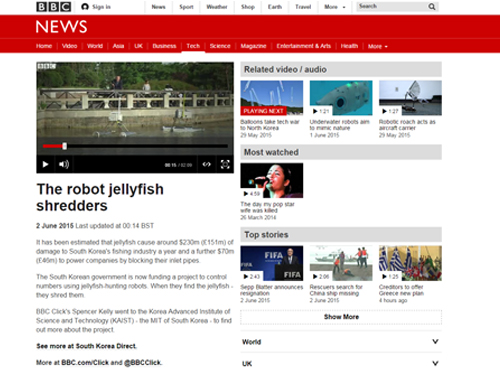 BBC Feautres KAIST's Jellyfish Robot
Click, a weekly BBC television program covering news and recent developments in science and technology, introduced KAIST’s robotics project, JEROS, which has been conducted by Professor Hyun Myung of the Urban Robotics Lab (http://urobot.kaist.ac.kr/). JEROS is a robotics system that detects, captures, and removes jellyfish in the ocean. For the show, please click the link below:
BBC News, Click, June 2, 2015
The Robot Jellyfish Shredders
http://www.bbc.com/news/technology-32965841
2015.06.03 View 10733
BBC Feautres KAIST's Jellyfish Robot
Click, a weekly BBC television program covering news and recent developments in science and technology, introduced KAIST’s robotics project, JEROS, which has been conducted by Professor Hyun Myung of the Urban Robotics Lab (http://urobot.kaist.ac.kr/). JEROS is a robotics system that detects, captures, and removes jellyfish in the ocean. For the show, please click the link below:
BBC News, Click, June 2, 2015
The Robot Jellyfish Shredders
http://www.bbc.com/news/technology-32965841
2015.06.03 View 10733 -
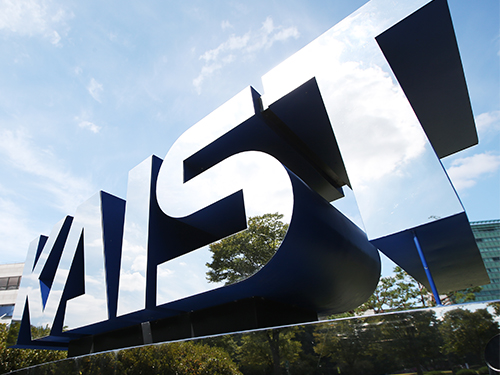 KAIST to Host Conference on the Financial Technology Industry
To take place in the Korea Federation of Banks building on May 21, 2015, Seoul
Around 200 individuals to be present including Oh-Kyu Kwon, the former Minister of Finance and Economy and Chang-Hyun Yun, the former president of Korea Institute of Finance
KAIST will hold a conference to discuss prospects for Korea’s financial technology industry (FinTech) and to address the rapid changes taking place in both national and global finance markets.
The conference will be held in the Convention Hall of the Korea Federation of Banks building in Myeongdong, Seoul on May 21, 2015 with a theme entitled “The Challenge and the Task of Korean FinTech Industry in the Global Finance Market.”
Around 200 individuals including Oh-Kyu Kwon, the former Minister of Finance and Economy, Jiwon Jung, a member of a standing committee of Financial Services Commission, and Steve Kang, the President of KAIST will attend the meeting.
The term “FinTech” originates from the combination of two words, finance and technology, to describe a new form of financial system based on Information Technology (IT). The precise definition and boundary of FinTech is not fully established yet, but this will provide Korea with an opportunity to take the lead in the finance industry with its cutting-edge IT.
The conference will focus on the methods by which Korean FinTech companies can acquire a competitive edge in the global finance market. The keynote speaker, Tong-Suk Kim, the Dean of College of Business, KAIST, will speak about “The Challenge and the Task of Korean FinTech.” The talk will emphasize how the FinTech industry can create an innovative industry, destroying the existing paradigm of payment system and Internet-only banks.
The keynote speech will be followed by a talk on “The Requirements for Establishing Korean FinTech Ecosystem” by Jong-Hyun Kim, a researcher at Woori Finance Research Institute, Korea.
Additional talks, which will be given by KAIST professors, are:
“Korean Economy and the Role of FinTech” by Professor Young-Sun Kwon of the Department Business and Technology Management;
“Korean FinTech in ICT Perspective” by Professor Yoon-Joon Lee of the Department of Computer Science;
“The Current State and Possibilities of Korean FinTech” by Professor Byung-Tae Lee of the School of Management Engineering; and
“The Task and Challenge of Promoting FinTech Industry” by Professor Byung-Chun Kim of the School of Management Engineering.
Also, Professor Chang-Hyun Yoon of the School of Business Administration, University of Seoul, will give a talk on “The Crisis in Korean Finance Industry and the Role of FinTech.”
The conference will also hold a discussion session on “The Promotion Methods for Korean FinTech Industry.” Participants for the discussion will include Jae-Sung Song from the Ministry of Science, ICT and Future Planning, Dong-Hwan Kim from the Financial Services Commission, Jeon Jin from Samsung Economic Research Institute (SERI), Hyo-Jin Lee of 8Percent, In-Chang Hwang from the Korea Insurance Research Institute, and Jae-Kyu Lee from Koscom.
Byung-Chun Kim, the Director of KAIST’s Financial Engineering Research Center, who organized the FinTech conference said, “FinTech industry will evolve from simply attempting to attract consumers to understanding the lifestyle patterns of consumers to provide customized service and information.”
2015.05.20 View 11935
KAIST to Host Conference on the Financial Technology Industry
To take place in the Korea Federation of Banks building on May 21, 2015, Seoul
Around 200 individuals to be present including Oh-Kyu Kwon, the former Minister of Finance and Economy and Chang-Hyun Yun, the former president of Korea Institute of Finance
KAIST will hold a conference to discuss prospects for Korea’s financial technology industry (FinTech) and to address the rapid changes taking place in both national and global finance markets.
The conference will be held in the Convention Hall of the Korea Federation of Banks building in Myeongdong, Seoul on May 21, 2015 with a theme entitled “The Challenge and the Task of Korean FinTech Industry in the Global Finance Market.”
Around 200 individuals including Oh-Kyu Kwon, the former Minister of Finance and Economy, Jiwon Jung, a member of a standing committee of Financial Services Commission, and Steve Kang, the President of KAIST will attend the meeting.
The term “FinTech” originates from the combination of two words, finance and technology, to describe a new form of financial system based on Information Technology (IT). The precise definition and boundary of FinTech is not fully established yet, but this will provide Korea with an opportunity to take the lead in the finance industry with its cutting-edge IT.
The conference will focus on the methods by which Korean FinTech companies can acquire a competitive edge in the global finance market. The keynote speaker, Tong-Suk Kim, the Dean of College of Business, KAIST, will speak about “The Challenge and the Task of Korean FinTech.” The talk will emphasize how the FinTech industry can create an innovative industry, destroying the existing paradigm of payment system and Internet-only banks.
The keynote speech will be followed by a talk on “The Requirements for Establishing Korean FinTech Ecosystem” by Jong-Hyun Kim, a researcher at Woori Finance Research Institute, Korea.
Additional talks, which will be given by KAIST professors, are:
“Korean Economy and the Role of FinTech” by Professor Young-Sun Kwon of the Department Business and Technology Management;
“Korean FinTech in ICT Perspective” by Professor Yoon-Joon Lee of the Department of Computer Science;
“The Current State and Possibilities of Korean FinTech” by Professor Byung-Tae Lee of the School of Management Engineering; and
“The Task and Challenge of Promoting FinTech Industry” by Professor Byung-Chun Kim of the School of Management Engineering.
Also, Professor Chang-Hyun Yoon of the School of Business Administration, University of Seoul, will give a talk on “The Crisis in Korean Finance Industry and the Role of FinTech.”
The conference will also hold a discussion session on “The Promotion Methods for Korean FinTech Industry.” Participants for the discussion will include Jae-Sung Song from the Ministry of Science, ICT and Future Planning, Dong-Hwan Kim from the Financial Services Commission, Jeon Jin from Samsung Economic Research Institute (SERI), Hyo-Jin Lee of 8Percent, In-Chang Hwang from the Korea Insurance Research Institute, and Jae-Kyu Lee from Koscom.
Byung-Chun Kim, the Director of KAIST’s Financial Engineering Research Center, who organized the FinTech conference said, “FinTech industry will evolve from simply attempting to attract consumers to understanding the lifestyle patterns of consumers to provide customized service and information.”
2015.05.20 View 11935 -
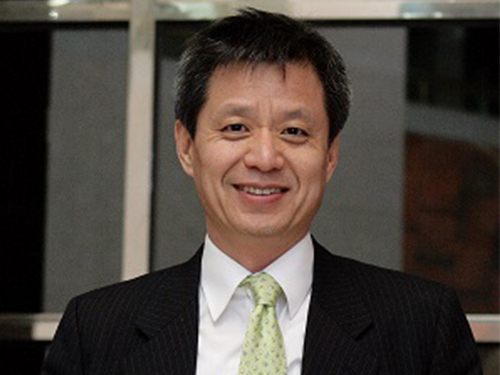 Professor Duck-Joo Lee Is Elected Vice Chairman of the American Helicopter Society
Professor Duck-Joo Lee of the Department of Aerospace Engineering at KAIST was elected to become the first Korean vice president of the American Helicopter Society (AHS). He will serve a two-year term, starting this July, and his responsibilities will cover Asia, Australia, and Russia.
AHS, established in 1943, is the biggest association in the field with 6,800 members. The society is intended to advance helicopter technology and vertical take-off and landing (VTOL) in airplane technology.
The AHS’s board of directors consists of thirty experts in rotorcrafts, including the president of Sikorsky Aircraft Corporation, a renowned American helicopter manufacturing company.
Professor Lee started his career as a researcher in NASA Ames Research Center in the United States, and is now an acknowledged scholar in the field of aircraft jet engines and helicopter Aero-Acoustics. He also worked as the Assistant Editor-in-Chief of Journal of the American Helicopter Society, the President of the first Asia-Australia Rotorcraft Forum, and the leader of National Task Force Team of Korean Military and Civil Helicopter.
2015.05.18 View 9954
Professor Duck-Joo Lee Is Elected Vice Chairman of the American Helicopter Society
Professor Duck-Joo Lee of the Department of Aerospace Engineering at KAIST was elected to become the first Korean vice president of the American Helicopter Society (AHS). He will serve a two-year term, starting this July, and his responsibilities will cover Asia, Australia, and Russia.
AHS, established in 1943, is the biggest association in the field with 6,800 members. The society is intended to advance helicopter technology and vertical take-off and landing (VTOL) in airplane technology.
The AHS’s board of directors consists of thirty experts in rotorcrafts, including the president of Sikorsky Aircraft Corporation, a renowned American helicopter manufacturing company.
Professor Lee started his career as a researcher in NASA Ames Research Center in the United States, and is now an acknowledged scholar in the field of aircraft jet engines and helicopter Aero-Acoustics. He also worked as the Assistant Editor-in-Chief of Journal of the American Helicopter Society, the President of the first Asia-Australia Rotorcraft Forum, and the leader of National Task Force Team of Korean Military and Civil Helicopter.
2015.05.18 View 9954 -
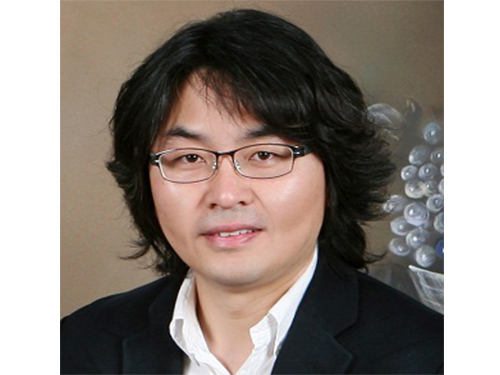 KAIST's Patina Engraving System Awarded at ACM CHI
Professor Tek-Jin Nam’s research team of the Industrial Design Department of KAIST received the Best Paper Award in the 2015 Association for Computing Machinery’s (ACM) Conference on Human Factors in Computing Systems (CHI) which was held from April 18 to 23, 2015. The team consisted of two KAIST students: Moon-Hwan Lee, a Ph.D. candidate, and Sejin Cha, a master's student. The team was the first in Asia to receive the award.
The ACM CHI represents the premier conference in the field of Human-Computer Interaction (HCI). This year’s event, held in Seoul, South Korea, was the first conference that the ACM had held in Asia in its thirty-three year history. The KAIST team’s paper, entitled “Patina Engraver: Visualizing Activity Logs as Patina in Fashionable Trackers,” ranked in the top 1% of 2,000 submitted papers.
The team developed Patina Engraver, an activity tracker, which monitors and tracks fitness-related metrics such as distances walked or run, calorie consumption, heartbeat, sleep quality, and blood pressure. The device wirelessly connects to a computer or smartphone so that it can store and utilize long-term tracking data.
However, what makes Patina Engraver, a smart wristband, different from other health trackers is its ability to display different design patterns based on users’ activity on the surface of the wristband. The research team was inspired to build this system from the fact that wearable electronics including activity trackers can be used not only as health care devices, but also as fashion items to express emotions and personalities.
Equipped with an engraving feature, the charging pad or holder for Patina Engraver draws individualized patterns to reflect the user’s activities, such as walking or running, while the device is being charged. The pattern display syncs with the frequency of usage, therefore, the more the tracker is used, the greater the number of patterns will show up.
According to the team, since Patina Engraver provides users with a personalized illustration of their activity on the tracker, users are more motivated to put on the tracker and exercise.
Professor Nam said, “This research can be applied in producing other wearable devices to enhance users’ emotional satisfaction. When wearable technology is combined with design and emotion, the industry market will quickly expand.”
Figure 1: Patina engraving system developed by KAIST research team
Figure 2: The process of engraving illustrations of the activity records onto the tracker
Figure 3: Personalized activity trackers based on activity records
2015.05.15 View 16440
KAIST's Patina Engraving System Awarded at ACM CHI
Professor Tek-Jin Nam’s research team of the Industrial Design Department of KAIST received the Best Paper Award in the 2015 Association for Computing Machinery’s (ACM) Conference on Human Factors in Computing Systems (CHI) which was held from April 18 to 23, 2015. The team consisted of two KAIST students: Moon-Hwan Lee, a Ph.D. candidate, and Sejin Cha, a master's student. The team was the first in Asia to receive the award.
The ACM CHI represents the premier conference in the field of Human-Computer Interaction (HCI). This year’s event, held in Seoul, South Korea, was the first conference that the ACM had held in Asia in its thirty-three year history. The KAIST team’s paper, entitled “Patina Engraver: Visualizing Activity Logs as Patina in Fashionable Trackers,” ranked in the top 1% of 2,000 submitted papers.
The team developed Patina Engraver, an activity tracker, which monitors and tracks fitness-related metrics such as distances walked or run, calorie consumption, heartbeat, sleep quality, and blood pressure. The device wirelessly connects to a computer or smartphone so that it can store and utilize long-term tracking data.
However, what makes Patina Engraver, a smart wristband, different from other health trackers is its ability to display different design patterns based on users’ activity on the surface of the wristband. The research team was inspired to build this system from the fact that wearable electronics including activity trackers can be used not only as health care devices, but also as fashion items to express emotions and personalities.
Equipped with an engraving feature, the charging pad or holder for Patina Engraver draws individualized patterns to reflect the user’s activities, such as walking or running, while the device is being charged. The pattern display syncs with the frequency of usage, therefore, the more the tracker is used, the greater the number of patterns will show up.
According to the team, since Patina Engraver provides users with a personalized illustration of their activity on the tracker, users are more motivated to put on the tracker and exercise.
Professor Nam said, “This research can be applied in producing other wearable devices to enhance users’ emotional satisfaction. When wearable technology is combined with design and emotion, the industry market will quickly expand.”
Figure 1: Patina engraving system developed by KAIST research team
Figure 2: The process of engraving illustrations of the activity records onto the tracker
Figure 3: Personalized activity trackers based on activity records
2015.05.15 View 16440 -
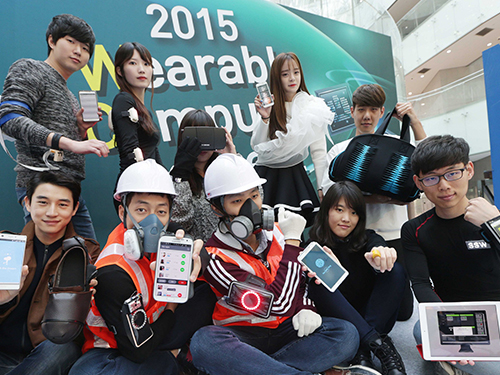 KAIST Hosts the Wearable Computer Contest 2015
Deadlines for Prototype Contest by May 30, 2015 and August 15 for Idea Contest
KAIST will hold the Wearable Computer Contest 2015 in November, which will be sponsored by Samsung Electronics Co., Ltd.
Wearable computers have emerged as next-generation mobile devices, and are gaining more popularity with the growth of the Internet of Things. KAIST has introduced wearable devices such as K-Glass 2, a smart glass with augmented reality embedded. The Glass also works on commands by blinking eyes.
This year’s contest with the theme of “Wearable Computers for Internet of Things” is divided into two parts: the Prototype Competition and Idea Contest.
With the fusion of information technology (IT) and fashion, contestants are encouraged to submit prototypes of their ideas by May 30, 2015. The ten teams that make it to the finals will receive a wearable computer platform and Human-Computer Interaction (HCI) education, along with a prize of USD 1,000 for prototype production costs. The winner of the Prototype Contest will receive a prize of USD 5,000 and an award from the Minister of Science, ICT and Future Planning (MSIP) of the Republic of Korea.
In the Idea Contest, posters containing ideas and concepts of wearable devices should be submitted by August 15, 2015. The teams that make it to the finals will have to display a life-size mockup in the final stage. The winner of the contest will receive a prize of USD 1,000 and an award from the Minister of MSIP.
Any undergraduate or graduate student in Korea can enter the Prototype Competition and anyone can participate in the Idea Contest.
The chairman of the event, Hoi-Jun Yoo, a professor of the Department of Electrical Engineering at KAIST, noted:
“There is a growing interest in wearable computers in the industry. I can easily envisage that there will be a new IT world where wearable computers are integrated into the Internet of Things, healthcare, and smart homes.”
More information on the contest can be found online at http://www.ufcom.org.
Picture: Finalists in the last year’s contest
2015.05.11 View 9431
KAIST Hosts the Wearable Computer Contest 2015
Deadlines for Prototype Contest by May 30, 2015 and August 15 for Idea Contest
KAIST will hold the Wearable Computer Contest 2015 in November, which will be sponsored by Samsung Electronics Co., Ltd.
Wearable computers have emerged as next-generation mobile devices, and are gaining more popularity with the growth of the Internet of Things. KAIST has introduced wearable devices such as K-Glass 2, a smart glass with augmented reality embedded. The Glass also works on commands by blinking eyes.
This year’s contest with the theme of “Wearable Computers for Internet of Things” is divided into two parts: the Prototype Competition and Idea Contest.
With the fusion of information technology (IT) and fashion, contestants are encouraged to submit prototypes of their ideas by May 30, 2015. The ten teams that make it to the finals will receive a wearable computer platform and Human-Computer Interaction (HCI) education, along with a prize of USD 1,000 for prototype production costs. The winner of the Prototype Contest will receive a prize of USD 5,000 and an award from the Minister of Science, ICT and Future Planning (MSIP) of the Republic of Korea.
In the Idea Contest, posters containing ideas and concepts of wearable devices should be submitted by August 15, 2015. The teams that make it to the finals will have to display a life-size mockup in the final stage. The winner of the contest will receive a prize of USD 1,000 and an award from the Minister of MSIP.
Any undergraduate or graduate student in Korea can enter the Prototype Competition and anyone can participate in the Idea Contest.
The chairman of the event, Hoi-Jun Yoo, a professor of the Department of Electrical Engineering at KAIST, noted:
“There is a growing interest in wearable computers in the industry. I can easily envisage that there will be a new IT world where wearable computers are integrated into the Internet of Things, healthcare, and smart homes.”
More information on the contest can be found online at http://www.ufcom.org.
Picture: Finalists in the last year’s contest
2015.05.11 View 9431 -
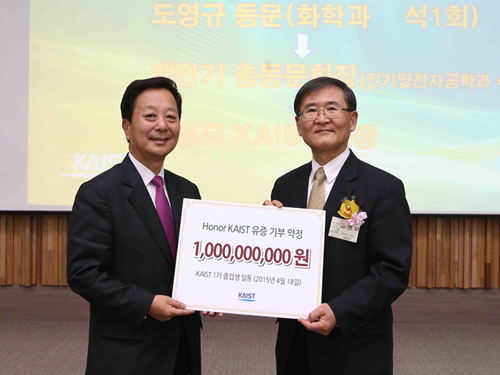 KAIST's Alumni Announces Its Vision to Raise Development Funds
The 40th anniversary of the Graduation and Homecoming Day took place at Seoul campus on April 18, 2015.
KAIST’s alumni announced its long-term vision called “Honor KAIST” to raise the development fund of USD 1 billion by 2100 at the 40th anniversary of “The First Master’s Graduation and Homecoming Day.” The anniversary ceremony took place at the Seoul campus on April 18, 2015. President Steve Kang, Man-Ki Paik, President of KAIST Alumni Association, and the first graduates of KAIST master’s program attended the event.
The first 106 master’s graduates of KAIST, the Class of 1975, received their degrees from eight departments. About 18 professors, including Dr. KunMo Chung, who taught the Class of 1975, and 52 graduates such as Suk-Joong Kang, Sik-Chol Kwon, Youngkyu Do, Sung Joo Park, Joon-Taik Park, Hyung-Kang Shin, Dong-Yol Yang, Seong Ihl Woo, Jae Kyu Lee, In-Won Lee, Byoung-Kyu Choi, and Kyu-Young Hwang participated in the homecoming event that proceeded with the tour of Seoul campus and the ceremony to deliver the first donation by the graduates.
The graduates involved in the vision campaign declared: “KAIST graduates have great pride in having taken part in advancing science and technology in Korea and are grateful for the education given by the nation. There is still a long way ahead for KAIST and Korea. The alumni should work together to help shaping the future of KAIST with great interest and affection for the institution.” They also urged KAIST graduates to donate more for their alma mater: “Let us try to participate in donating USD 100,000 in our lifetime!” The graduates added, “Having donations up to USD 1 billion helped MIT become a great university. We should take the lead in aiming to collect such amount by 2100 for KAIST.”
President Kang addressed the ceremony and said in his speech, “The Honor KAIST Development Funds will serve as the foundation for the university’s continuous, strong growth. Every member of KAIST will work in harmony to transfer KAIST into one of the top ten research universities in the world.” He continued, “The funds will be used to further future strategies of KAIST such as high impact Nobel-prize level research and innovative education.”
Contributors will receive benefits including an honorary lifetime email account entitled “Honor.KAIST” and will have their names listed on “The Honor KAIST” website and “The Honor KAIST” commemorative wall.
Picture 1: The First Master’s Graduation and Homecoming Day 2015
Picture 2: President Steve Kang (right) and President Man-Ki Paik of the KAIST Alumni Association
2015.04.22 View 10651
KAIST's Alumni Announces Its Vision to Raise Development Funds
The 40th anniversary of the Graduation and Homecoming Day took place at Seoul campus on April 18, 2015.
KAIST’s alumni announced its long-term vision called “Honor KAIST” to raise the development fund of USD 1 billion by 2100 at the 40th anniversary of “The First Master’s Graduation and Homecoming Day.” The anniversary ceremony took place at the Seoul campus on April 18, 2015. President Steve Kang, Man-Ki Paik, President of KAIST Alumni Association, and the first graduates of KAIST master’s program attended the event.
The first 106 master’s graduates of KAIST, the Class of 1975, received their degrees from eight departments. About 18 professors, including Dr. KunMo Chung, who taught the Class of 1975, and 52 graduates such as Suk-Joong Kang, Sik-Chol Kwon, Youngkyu Do, Sung Joo Park, Joon-Taik Park, Hyung-Kang Shin, Dong-Yol Yang, Seong Ihl Woo, Jae Kyu Lee, In-Won Lee, Byoung-Kyu Choi, and Kyu-Young Hwang participated in the homecoming event that proceeded with the tour of Seoul campus and the ceremony to deliver the first donation by the graduates.
The graduates involved in the vision campaign declared: “KAIST graduates have great pride in having taken part in advancing science and technology in Korea and are grateful for the education given by the nation. There is still a long way ahead for KAIST and Korea. The alumni should work together to help shaping the future of KAIST with great interest and affection for the institution.” They also urged KAIST graduates to donate more for their alma mater: “Let us try to participate in donating USD 100,000 in our lifetime!” The graduates added, “Having donations up to USD 1 billion helped MIT become a great university. We should take the lead in aiming to collect such amount by 2100 for KAIST.”
President Kang addressed the ceremony and said in his speech, “The Honor KAIST Development Funds will serve as the foundation for the university’s continuous, strong growth. Every member of KAIST will work in harmony to transfer KAIST into one of the top ten research universities in the world.” He continued, “The funds will be used to further future strategies of KAIST such as high impact Nobel-prize level research and innovative education.”
Contributors will receive benefits including an honorary lifetime email account entitled “Honor.KAIST” and will have their names listed on “The Honor KAIST” website and “The Honor KAIST” commemorative wall.
Picture 1: The First Master’s Graduation and Homecoming Day 2015
Picture 2: President Steve Kang (right) and President Man-Ki Paik of the KAIST Alumni Association
2015.04.22 View 10651 -
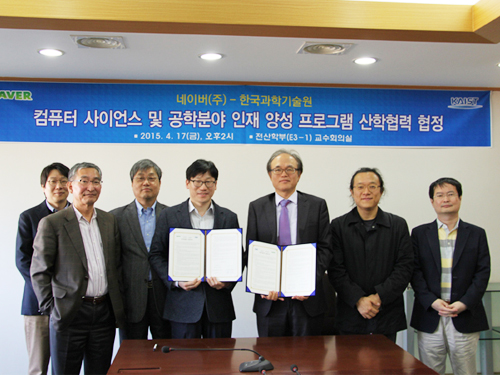 KAIST and the Naver Corporation Agree to Cooperate in Computer Science
KAIST and Naver, a Korean Internet corporation, concluded a memorandum of understanding (MOU) on April 17, 2015, to cooperate in advancing research and education in computer science.
Doo-Hwan Bae (pictured on the right below), the Dean of School of Computing at KAIST and Jong-Mok Park (pictured on left), the Director of Technical Cooperation at Naver, signed the MOU.
Under this agreement, the two organizations will foster computer scientists and engineers, conduct joint research projects, and develop training programs for entrepreneurs.
KAIST and Naver will organize a steering committee to lay out further details on the agreement.
2015.04.17 View 10036
KAIST and the Naver Corporation Agree to Cooperate in Computer Science
KAIST and Naver, a Korean Internet corporation, concluded a memorandum of understanding (MOU) on April 17, 2015, to cooperate in advancing research and education in computer science.
Doo-Hwan Bae (pictured on the right below), the Dean of School of Computing at KAIST and Jong-Mok Park (pictured on left), the Director of Technical Cooperation at Naver, signed the MOU.
Under this agreement, the two organizations will foster computer scientists and engineers, conduct joint research projects, and develop training programs for entrepreneurs.
KAIST and Naver will organize a steering committee to lay out further details on the agreement.
2015.04.17 View 10036 -
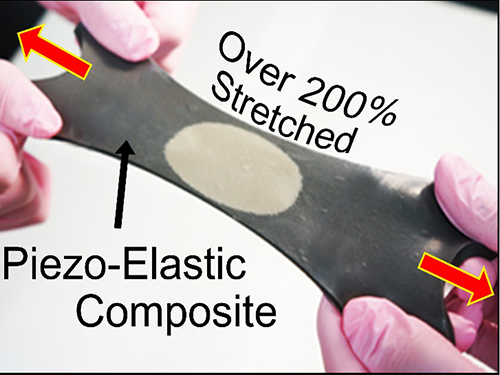 KAIST Researchers Develops Hyper-Stretchable Elastic-Composite Energy Harvester
A research team led by Professor Keon Jae Lee (http://fand.kaist.ac.kr) of the Department of Materials Science and Engineering at KAIST has developed a hyper-stretchable elastic-composite energy harvesting device called a nanogenerator.
Flexible electronics have come into the market and are enabling new technologies like flexible displays in mobile phone, wearable electronics, and the Internet of Things (IoTs). However, is the degree of flexibility enough for most applications? For many flexible devices, elasticity is a very important issue. For example, wearable/biomedical devices and electronic skins (e-skins) should stretch to conform to arbitrarily curved surfaces and moving body parts such as joints, diaphragms, and tendons. They must be able to withstand the repeated and prolonged mechanical stresses of stretching. In particular, the development of elastic energy devices is regarded as critical to establish power supplies in stretchable applications. Although several researchers have explored diverse stretchable electronics, due to the absence of the appropriate device structures and correspondingly electrodes, researchers have not developed ultra-stretchable and fully-reversible energy conversion devices properly.
Recently, researchers from KAIST and Seoul National University (SNU) have collaborated and demonstrated a facile methodology to obtain a high-performance and hyper-stretchable elastic-composite generator (SEG) using very long silver nanowire-based stretchable electrodes. Their stretchable piezoelectric generator can harvest mechanical energy to produce high power output (~4 V) with large elasticity (~250%) and excellent durability (over 104 cycles). These noteworthy results were achieved by the non-destructive stress- relaxation ability of the unique electrodes as well as the good piezoelectricity of the device components. The new SEG can be applied to a wide-variety of wearable energy-harvesters to transduce biomechanical-stretching energy from the body (or machines) to electrical energy.
Professor Lee said, “This exciting approach introduces an ultra-stretchable piezoelectric generator. It can open avenues for power supplies in universal wearable and biomedical applications as well as self-powered ultra-stretchable electronics.”
This result was published online in the March issue of Advanced Materials, which is entitled “A Hyper-Stretchable Elastic-Composite Energy Harvester.”
YouTube Link: “A hyper-stretchable energy harvester”
https://www.youtube.com/watch?v=EBByFvPVRiU&feature=youtu.be
Figure: Top row: Schematics of hyper-stretchable elastic-composite generator enabled by very long silver nanowire-based stretchable electrodes.
Bottom row: The SEG energy harvester stretched by human hands over 200% strain.
2015.04.14 View 15382
KAIST Researchers Develops Hyper-Stretchable Elastic-Composite Energy Harvester
A research team led by Professor Keon Jae Lee (http://fand.kaist.ac.kr) of the Department of Materials Science and Engineering at KAIST has developed a hyper-stretchable elastic-composite energy harvesting device called a nanogenerator.
Flexible electronics have come into the market and are enabling new technologies like flexible displays in mobile phone, wearable electronics, and the Internet of Things (IoTs). However, is the degree of flexibility enough for most applications? For many flexible devices, elasticity is a very important issue. For example, wearable/biomedical devices and electronic skins (e-skins) should stretch to conform to arbitrarily curved surfaces and moving body parts such as joints, diaphragms, and tendons. They must be able to withstand the repeated and prolonged mechanical stresses of stretching. In particular, the development of elastic energy devices is regarded as critical to establish power supplies in stretchable applications. Although several researchers have explored diverse stretchable electronics, due to the absence of the appropriate device structures and correspondingly electrodes, researchers have not developed ultra-stretchable and fully-reversible energy conversion devices properly.
Recently, researchers from KAIST and Seoul National University (SNU) have collaborated and demonstrated a facile methodology to obtain a high-performance and hyper-stretchable elastic-composite generator (SEG) using very long silver nanowire-based stretchable electrodes. Their stretchable piezoelectric generator can harvest mechanical energy to produce high power output (~4 V) with large elasticity (~250%) and excellent durability (over 104 cycles). These noteworthy results were achieved by the non-destructive stress- relaxation ability of the unique electrodes as well as the good piezoelectricity of the device components. The new SEG can be applied to a wide-variety of wearable energy-harvesters to transduce biomechanical-stretching energy from the body (or machines) to electrical energy.
Professor Lee said, “This exciting approach introduces an ultra-stretchable piezoelectric generator. It can open avenues for power supplies in universal wearable and biomedical applications as well as self-powered ultra-stretchable electronics.”
This result was published online in the March issue of Advanced Materials, which is entitled “A Hyper-Stretchable Elastic-Composite Energy Harvester.”
YouTube Link: “A hyper-stretchable energy harvester”
https://www.youtube.com/watch?v=EBByFvPVRiU&feature=youtu.be
Figure: Top row: Schematics of hyper-stretchable elastic-composite generator enabled by very long silver nanowire-based stretchable electrodes.
Bottom row: The SEG energy harvester stretched by human hands over 200% strain.
2015.04.14 View 15382 -
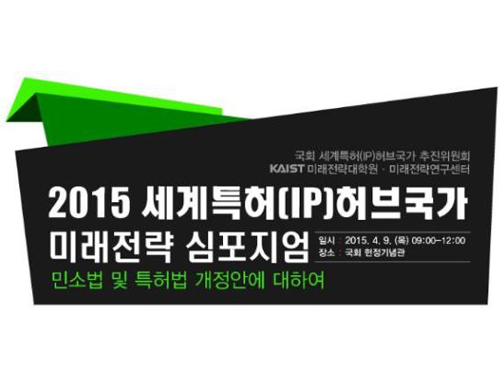 KAIST Hosts a Symposium on IPR
KAIST’s Graduate School of Future Strategy (http://futures.kaist.ac.kr) hosted a symposium entitled “Future Strategies to Grow Korea as the Hub for the World’s Intellectual Property Rights (IPRs)” under the theme of “Patent Laws and a Revised Bill for the Code of Civil Procedures” in the National Assembly’s Memorial Hall on April 9, 2015.
Experts who attended the symposium included Professor James Dator, Director of the Hawaii Research Center for Futures Studies, Sang-Wook Han, a lawyer and Vice President of Korea Intellectual Property Protection Association (KIPRA), and Min Seo, a former Chairman of Civil Law Revision Commission of the Ministry of Justice, Korea.
The event consisted of special lectures, patent law presentations, a revised bill for the code of civil procedures in patent law, and a general discussion forum. Professor Dator, the keynote speaker, addressed the future of intellectual property. San-Wook Han (KIPRA) talked about new and effective changes in Korean patent law such as the compensation against IPR violations and the reduction of legal burden of proof in IPR disputes. Min Seo from the Ministry of Justice moderated a panel of eight members, which offered an in-depth discussion on the revised bill.
A ceremony for “The Third Future Strategy Award” was also held at the symposium. Yeon-Soo Park, former Administrator of the National Emergency Management Agency, received the award for his work on the Northeast Asian International Business Center City Project which enabled the construction of Incheon International Airport and Songdo International City.
2015.04.09 View 12457
KAIST Hosts a Symposium on IPR
KAIST’s Graduate School of Future Strategy (http://futures.kaist.ac.kr) hosted a symposium entitled “Future Strategies to Grow Korea as the Hub for the World’s Intellectual Property Rights (IPRs)” under the theme of “Patent Laws and a Revised Bill for the Code of Civil Procedures” in the National Assembly’s Memorial Hall on April 9, 2015.
Experts who attended the symposium included Professor James Dator, Director of the Hawaii Research Center for Futures Studies, Sang-Wook Han, a lawyer and Vice President of Korea Intellectual Property Protection Association (KIPRA), and Min Seo, a former Chairman of Civil Law Revision Commission of the Ministry of Justice, Korea.
The event consisted of special lectures, patent law presentations, a revised bill for the code of civil procedures in patent law, and a general discussion forum. Professor Dator, the keynote speaker, addressed the future of intellectual property. San-Wook Han (KIPRA) talked about new and effective changes in Korean patent law such as the compensation against IPR violations and the reduction of legal burden of proof in IPR disputes. Min Seo from the Ministry of Justice moderated a panel of eight members, which offered an in-depth discussion on the revised bill.
A ceremony for “The Third Future Strategy Award” was also held at the symposium. Yeon-Soo Park, former Administrator of the National Emergency Management Agency, received the award for his work on the Northeast Asian International Business Center City Project which enabled the construction of Incheon International Airport and Songdo International City.
2015.04.09 View 12457 -
 Wall Climbing Quadcopter by KAIST Urban Robotics Lab
Popular Science, an American monthly magazine devoted to general readers of science and technology, published “Watch This Creepy Drone Climb A Wall” online describing a drone that can fly and climb walls on March 19, 2015. The drone is the product of research conducted by Professor Hyun Myung of the Department of Civil and Environmental Engineering at KAIST. The flying quadcopters can turn into wall-crawling robots, or vice versa, when carrying out such assignments as cleaning windows or inspecting a building’s infrastructure. Professor Myung leads the KAIST Urban Robotics Lab (http://urobot.kaist.ac.kr/). For a link to the article, see http://www.popsci.com/watch-drone-climb-wall-video.
Another Popular Science article (posted on April 3, 2015), entitled “South Korea Gets Ready for Drone-on-Drone Warfare with North Korea,” describes a combat system of drones against hostile drones. Professor Hyunchul Shim of the Aerospace Engineering Department at KAIST developed the anti-drone system. He currently heads the Unmanned System Research Group, FDCL, http://unmanned.kaist.ac.kr/) and the Center of Field Robotics for Innovation, Exploration, aNd Defense (C-FRIEND).
2015.04.07 View 14167
Wall Climbing Quadcopter by KAIST Urban Robotics Lab
Popular Science, an American monthly magazine devoted to general readers of science and technology, published “Watch This Creepy Drone Climb A Wall” online describing a drone that can fly and climb walls on March 19, 2015. The drone is the product of research conducted by Professor Hyun Myung of the Department of Civil and Environmental Engineering at KAIST. The flying quadcopters can turn into wall-crawling robots, or vice versa, when carrying out such assignments as cleaning windows or inspecting a building’s infrastructure. Professor Myung leads the KAIST Urban Robotics Lab (http://urobot.kaist.ac.kr/). For a link to the article, see http://www.popsci.com/watch-drone-climb-wall-video.
Another Popular Science article (posted on April 3, 2015), entitled “South Korea Gets Ready for Drone-on-Drone Warfare with North Korea,” describes a combat system of drones against hostile drones. Professor Hyunchul Shim of the Aerospace Engineering Department at KAIST developed the anti-drone system. He currently heads the Unmanned System Research Group, FDCL, http://unmanned.kaist.ac.kr/) and the Center of Field Robotics for Innovation, Exploration, aNd Defense (C-FRIEND).
2015.04.07 View 14167 -
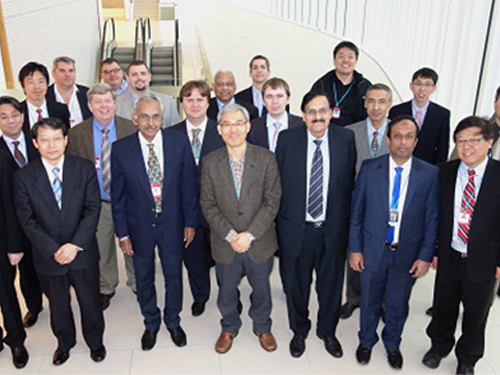 Professor Rim Presents at IAEA Workshop in Vienna
Professor Chun-Taek Rim of the Department of Nuclear and Quantum Engineering at KAIST recently attended the International Atomic Energy Agency (IAEA)’s workshop on the Application of Wireless Technologies in Nuclear Power Plant Instrumentation and Control System. It took place on March 30-April 2, 2015, in Vienna, Austria.
Representing Korea, Professor Rim gave a talk entitled “Highly Reliable Wireless Power and Communications under Severe Accident of Nuclear Power Plants (NPPs).” About 20 industry experts from 12 countries such as AREVA (France), Westinghouse (US), Oak Ridge National Laboratory (US), Hitachi (Japan), and ENEA (Italy) joined the meeting.
The IAEA hosted the workshop to explore the application of wireless technology for the operation and management of NPPs. It formed a committee consisting of eminent professionals worldwide in NPP instrumentation and control systems, communications, and nuclear power to examine this issue in-depth and to conduct various research projects for the next three years.
In particular, the committee will concentrate its research on improving the reliability and safety of using wireless technology, not only in the normal operation of nuclear plants but also in extreme conditions such as the Fukushima Daiichi nuclear accident. The complementation, economic feasibility, and standardization of NPPs when applying wireless technology will be also discussed.
Professor Rim currently leads the Nuclear Power Electronics
and Robotics Lab at KAIST (http://tesla.kaist.ac.kr/index_eng.php?lag=eng).
Picture 1: Professors Rim presents his topic at the IAEA Workshop in Vienna.
Picture 2: The IAEA Workshop Participants
2015.04.07 View 15120
Professor Rim Presents at IAEA Workshop in Vienna
Professor Chun-Taek Rim of the Department of Nuclear and Quantum Engineering at KAIST recently attended the International Atomic Energy Agency (IAEA)’s workshop on the Application of Wireless Technologies in Nuclear Power Plant Instrumentation and Control System. It took place on March 30-April 2, 2015, in Vienna, Austria.
Representing Korea, Professor Rim gave a talk entitled “Highly Reliable Wireless Power and Communications under Severe Accident of Nuclear Power Plants (NPPs).” About 20 industry experts from 12 countries such as AREVA (France), Westinghouse (US), Oak Ridge National Laboratory (US), Hitachi (Japan), and ENEA (Italy) joined the meeting.
The IAEA hosted the workshop to explore the application of wireless technology for the operation and management of NPPs. It formed a committee consisting of eminent professionals worldwide in NPP instrumentation and control systems, communications, and nuclear power to examine this issue in-depth and to conduct various research projects for the next three years.
In particular, the committee will concentrate its research on improving the reliability and safety of using wireless technology, not only in the normal operation of nuclear plants but also in extreme conditions such as the Fukushima Daiichi nuclear accident. The complementation, economic feasibility, and standardization of NPPs when applying wireless technology will be also discussed.
Professor Rim currently leads the Nuclear Power Electronics
and Robotics Lab at KAIST (http://tesla.kaist.ac.kr/index_eng.php?lag=eng).
Picture 1: Professors Rim presents his topic at the IAEA Workshop in Vienna.
Picture 2: The IAEA Workshop Participants
2015.04.07 View 15120 -
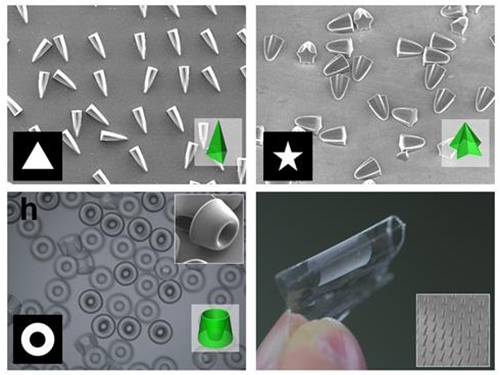 Novel Photolithographic Technology Enabling 3D Control over Functional Shapes of Microstructures
Professor Shin-Hyun Kim and his research team in the Department of Chemical and Biomolecular Engineering at KAIST have developed a novel photolithographic technology enabling control over the functional shapes of micropatterns using oxygen diffusion.
The research was published online in the March 13th issue of Nature Communications and was selected as a featured image for the journal.
Photolithography is a standard optical process for transferring micropatterns on to a substrate by exposing specific regions of the photoresist layer to ultraviolet (UV) light. It is used widely throughout industries that require micropatterns, especially in the semiconductor manufacturing industry.
Conventional photolithography relied on photomasks which protected certain regions of the substrate from the input UV light. Areas covered by the photomasks remain intact with the base layer while the areas exposed to the UV light are washed away, thus creating a micropattern. This technology was limited to a two-dimensional, disc-shaped design as the boundaries between the exposed and roofed regions are always in a parallel arrangement with the direction of the light.
Professor Kim’s research team discovered that: 1) the areas exposed to UV light lowered the concentration of oxygen and thus resulted in oxygen diffusion; and 2) manipulation of the diffusion speed and direction allowed control of the growth, shape and size of the polymers. Based on these findings, the team developed a new photolithographic technology that enabled the production of micropatterns with three-dimensional structures in various shapes and sizes.
Oxygen was considered an inhibitor during photopolymerization. Photoresist under UV light creates radicals which initialize a chemical reaction. These radicals are eliminated with the presence of oxygen and thus prevents the reaction. This suggests that the photoresist must be exposed to UV light for an extended time to completely remove oxygen for a chemical reaction to begin.
The research team, however, exploited the presence of oxygen. While the region affected by the UV light lowered oxygen concentration, the concentration in the untouched region remained unchanged. This difference in the concentrations caused a diffusion of oxygen to the region under UV light.
When the speed of the oxygen flow is slow, the diffusion occurs in parallel with the direction of the UV light. When fast, the diffusion process develops horizontally, outward from the area affected by the UV light. Professor Kim and his team proved this phenomenon both empirically and theoretically. Furthermore, by injecting an external oxygen source, the team was able to manipulate diffusion strength and direction, and thus control the shape and size of the polymer. The use of the polymerization inhibitors enabled and facilitated the fabrication of complex, three-dimensional micropatterns.
Professor Kim said, “While 3D printing is considered an innovative manufacturing technology, it cannot be used for mass-production of microscopic products. The new photolithographic technology will have a broad impact on both the academia and industry especially because existing, conventional photolithographic equipment can be used for the development of more complex micropatterns.” His newest technology will enhance the manufacturing process of three-dimensional polymers which were considered difficult to be commercialized.
The research was also dedicated to the late Professor Seung-Man Yang of the Department of Chemical and Biomolecular Engineering at KAIST. He was considered one of the greatest scholars in Korea in the field of hydrodynamics and colloids.
Picture 1: Featured Image of Nature Communications, March 2015
Picture 2: Polymers with various shapes and sizes produced with the new photolithographic technology developed by Professor Kim
2015.04.06 View 12205
Novel Photolithographic Technology Enabling 3D Control over Functional Shapes of Microstructures
Professor Shin-Hyun Kim and his research team in the Department of Chemical and Biomolecular Engineering at KAIST have developed a novel photolithographic technology enabling control over the functional shapes of micropatterns using oxygen diffusion.
The research was published online in the March 13th issue of Nature Communications and was selected as a featured image for the journal.
Photolithography is a standard optical process for transferring micropatterns on to a substrate by exposing specific regions of the photoresist layer to ultraviolet (UV) light. It is used widely throughout industries that require micropatterns, especially in the semiconductor manufacturing industry.
Conventional photolithography relied on photomasks which protected certain regions of the substrate from the input UV light. Areas covered by the photomasks remain intact with the base layer while the areas exposed to the UV light are washed away, thus creating a micropattern. This technology was limited to a two-dimensional, disc-shaped design as the boundaries between the exposed and roofed regions are always in a parallel arrangement with the direction of the light.
Professor Kim’s research team discovered that: 1) the areas exposed to UV light lowered the concentration of oxygen and thus resulted in oxygen diffusion; and 2) manipulation of the diffusion speed and direction allowed control of the growth, shape and size of the polymers. Based on these findings, the team developed a new photolithographic technology that enabled the production of micropatterns with three-dimensional structures in various shapes and sizes.
Oxygen was considered an inhibitor during photopolymerization. Photoresist under UV light creates radicals which initialize a chemical reaction. These radicals are eliminated with the presence of oxygen and thus prevents the reaction. This suggests that the photoresist must be exposed to UV light for an extended time to completely remove oxygen for a chemical reaction to begin.
The research team, however, exploited the presence of oxygen. While the region affected by the UV light lowered oxygen concentration, the concentration in the untouched region remained unchanged. This difference in the concentrations caused a diffusion of oxygen to the region under UV light.
When the speed of the oxygen flow is slow, the diffusion occurs in parallel with the direction of the UV light. When fast, the diffusion process develops horizontally, outward from the area affected by the UV light. Professor Kim and his team proved this phenomenon both empirically and theoretically. Furthermore, by injecting an external oxygen source, the team was able to manipulate diffusion strength and direction, and thus control the shape and size of the polymer. The use of the polymerization inhibitors enabled and facilitated the fabrication of complex, three-dimensional micropatterns.
Professor Kim said, “While 3D printing is considered an innovative manufacturing technology, it cannot be used for mass-production of microscopic products. The new photolithographic technology will have a broad impact on both the academia and industry especially because existing, conventional photolithographic equipment can be used for the development of more complex micropatterns.” His newest technology will enhance the manufacturing process of three-dimensional polymers which were considered difficult to be commercialized.
The research was also dedicated to the late Professor Seung-Man Yang of the Department of Chemical and Biomolecular Engineering at KAIST. He was considered one of the greatest scholars in Korea in the field of hydrodynamics and colloids.
Picture 1: Featured Image of Nature Communications, March 2015
Picture 2: Polymers with various shapes and sizes produced with the new photolithographic technology developed by Professor Kim
2015.04.06 View 12205